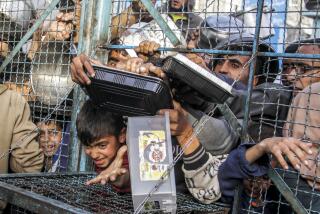South Sudan looting of aid reflects the new nation’s setbacks
MALAKAL, South Sudan — The looters came by the thousands. They were organized, systematic and took their time.
At two World Food Program warehouses in this dusty South Sudanese town, they opened thousands of USAID cans of vegetable oil and poured the contents into stolen jerry cans. They ripped open packets of high-nutrition food and took the contents. They stole computers, light fittings, fans and roof tiles, and even cut away the canvas from storage tents.
The food they took — 1,700 tons in all — would have fed more than 100,000 families for a month.
Left scattered in the dust Friday were family ration cards, the empty oil cans — marked “Not to be sold or exchanged” — and a measuring tape used to assess extreme malnutrition in young children.
The debris conveyed the despair over just how much has gone wrong in the world’s newest country and how quickly it all unraveled. Not only is South Sudan back to square one, but the humanitarian agencies that have pumped billions of dollars in aid into the region over the decades are back there with it.
More than 860,000 South Sudanese fled their homes when violence flared in December between forces loyal to the president and those backing his former vice president, splitting the ruling Sudan People’s Liberation Movement and unleashing what human rights observers have described as horrific ethnic killings.
Fighting has continued in Jonglei, Unity and Lakes states, despite a deal signed Jan. 23 to cease hostilities. Doctors Without Borders said in a statement Friday that thousands of people had been forced to flee in Unity, including 240 members of its local staff, who took several dozen seriously ill people with them into the bush.
The conflict has left about 3.7 million people in need of basic food assistance, setting back the once-ambitious plans of aid agencies for the 2-year-old nation.
The World Food Program, the food aid arm of the United Nations, in November proposed moving the country from emergency assistance to longer-term projects, such as irrigation works, designed to improve food security, officials said.
“Here we are now, just a few months later, talking about looting of warehouses, emergency food projects and empty markets. It’s just sad,” said Valerie Guarnieri, regional WFP director, who visited Malakal on Friday.
“This took days,” she said of the looting, stepping over empty cans amid the stench of spilled oil. “This was systematic.”
Launching the new vision for WFP operations at a board meeting in Rome had been “just this really emotional moment,” she said. “Now it’s back to basics.”
The looting occurred as control of Malakal seesawed between rebels and government troops in mid-to-late-January. Now the town is in government hands.
The governor of Upper Nile state described the looting to Guarnieri and her WFP colleagues.
“They came here to loot,” said Gov. Simon Kun Pouch, who said rebels were responsible for most of the theft. “We need reconciliation, because it’s one country that’s fighting itself.
“What we are saying as a state is that we need your help,” he told Guarnieri. “This disaster has affected people very badly because the looting has gone into their individual houses.”
WFP officials said residents as well as government and rebel soldiers were involved in the looting. There were reports that two drivers for humanitarian agencies also took part.
“There were people with donkey carts loading it up and taking it away. There were women carrying it on their heads,” said a WFP official, who requested anonymity for security reasons. “It was everybody.”
Looting of WFP warehouses has been reported in other states as well. Overall, an estimated 4,300 tons of food has been stolen nationwide.
Nearly 28,000 people in Malakal have taken refuge at a base for U.N. peacekeepers, who have been in the region for years, while others fled to the hospital and churches. As many as 45,000 people crossed the White Nile on small wooden boats to the village of Wau Shilluk, whose population has doubled.
“There’s no food,” said James Othow Aba, 56, who fled across the river with nine children and his wife. “I went to the clinic, but there’s no medicine.”
On Friday, the WFP made the first delivery of humanitarian aid to Wau Shilluk, flown by helicopter from Juba, the capital.
The continued clashes have forced the U.N. agency to resort to airlifting food, an expensive way to deliver aid. However, efforts are underway to open the border between Sudan and South Sudan, a road corridor closed since this nation formally gained independence from Sudan in 2011 after a 22-year war, which ended in 2005.
South Sudan’s short history has been plagued by trouble, including the theft of $4 billion from government coffers — for which President Salva Kiir blames his enemies in the ruling party — and a bitter conflict over oil transit levies with Sudan, which led Kiir to shut down production for more than a year, even though his country depends on oil revenue for 98% of its budget.
Kiir’s firing of his Cabinet in July, including prominent ruling party figures who had announced that they planned to run against him for president, was one trigger that led to the current crisis.
After violence broke out in December, he accused 11 of the sacked ministers of launching a coup attempt. Seven have been released and have flown to Kenya; four remain in custody.
More to Read
Sign up for Essential California
The most important California stories and recommendations in your inbox every morning.
You may occasionally receive promotional content from the Los Angeles Times.










